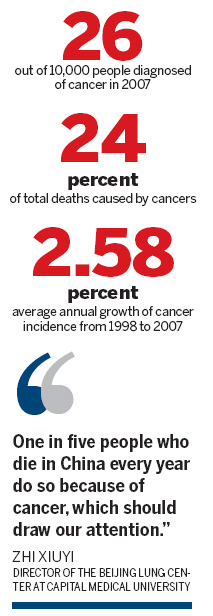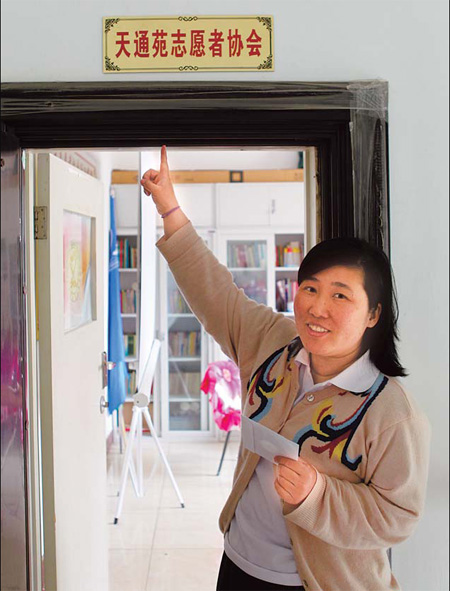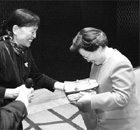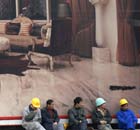Top Stories
High cancer rate ratchets up demand for social support
By Yang Wanli (China Daily)
Updated: 2010-04-29 07:56
 |
Large Medium Small |
|
Jiang Ying, director of the Tiantongyuan volunteer association, points to the name plate of her group. [Wang Jing / China Daily] |
An increasing number of cases has highlighted insufficient assistance
A rising number of cancer cases has highlighted the shortcomings of the capital's support network to cater to patients' physical and mental needs.
Malignant tumors have been the No 1 killer in Beijing every year since 2007. But when it comes to non-governmental organizations, only the Beijing Cancer Rehabilitation Center and the Beijing Anti-Cancer Club stand at the ready to assist people in their ongoing struggle.
"We are powerless to handle all the patients in Beijing," said Sun Guilan, president of the Beijing Anti-Cancer Club. "Although lots of patients in the outer suburbs are passionate about the club's group activities, our ability falls short of their wishes."

More than 10,000 patients are registered with the Beijing Anti-Cancer Club, and roughly half of them regularly attend group activities. The club has 19 branches, most in the downtown areas.
Advocates for patients say the two NGOs can hardly cover all parts of Beijing and keep up with the demand created by 34,000 cancer patients in the city.
According to the Beijing municipal health bureau, the incidence of malignant tumors increased by an average 2.58 percent annually from 1998 to 2007 in Beijing. The bureau reported that in 2007, 26 in 10,000 people were diagnosed with cancer and that 24 percent of total deaths that year were caused by malignant tumors, or cancer.
"One in five people who die in China every year do so because of cancer, which should draw our attention," said Zhi Xiuyi, director of the Beijing lung center at Capital Medical University. "Medical help and living conditions, such as diet and daily habits, will strongly influence patient health. Mental help is quite essential to them, too."
For many patients who are eager for group activities, two NGOs simply aren't enough.
"I felt constrained after being diagnosed with stomach cancer two years ago," said Peng Minghui, 63, a resident of the Tiantongyuan community. "I expected to share my feelings with those who can truly understand me, but there was no such group for me to join."
As the biggest residential community in north Beijing with about 400,000 residents, mostly young people, Tiantongyuan is estimated to have more than 100 patients with malignant tumors. But until recently, no organization in the area has catered to their needs.
On March 18, a 75-year-old resident, Wan Yuanqing, initiated a volunteer group called Anti-Cancer Garden. Supported by the Tiantongyuan volunteer association, Anti-Cancer Garden has already assisted more than 20 patients.
"Those patients need their own social circles in which they can exchange their experiences fighting the disease," Wan said. "Doing more exercises with other patients and bravery to face disease are what they can get from the group activities."
In 1993, Wan was diagnosed with stomach cancer, and part of her stomach was removed. But after 17 years, she is able to walk to buy food and even encourage cancer-stricken friends and acquaintances. A positive attitude and regular exercise saved her, she said. Now she is confident and eager to help more people.
Starting the volunteer group was no easy feat.
"She tried several times and didn't get any reply from the public sector. Finally, the Tiantongyuan volunteer association offered help," said Wan's husband, surnamed Shen.
In the past month, the group promoted four activities for patients and Wan even operated a hotline providing mental help to those patients. She has received more than 20 calls to date, with some coming from other provinces.
Wan believes in the power of positive thinking.
"Some patients are scared by the disease and show bad tempers to their families," she said. "The encouragement from other survivors in the group activities can strongly help them."
Jiang Ying, who is responsible for the Tiantongyuan volunteer association, said some patients are frightened by the disease and seek folk remedies because of their anguish.
"They spend lots of time on something useless and miss the best time for proper treatment," Jiang said.
She noted that many community residents invited cancer-patient friends from outside the area to join the group.
According to the Ministry of Health, as many as 1.5 million people died of cancer in 2000 in China, accounting for a quarter of such deaths worldwide.








